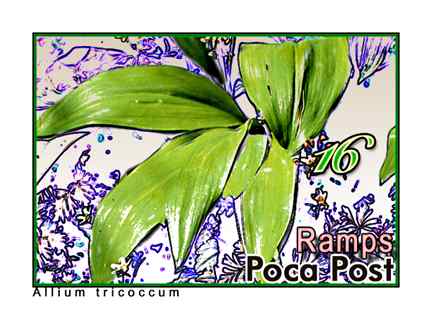
Allium tricoccum
Ramps: A West Virginia
Treat
|
The Poca Post is pleased to announce a stamp honoring the
renowned West Virginia herb locally called Ramps.
Among the earliest settlers were the Welsh. Then, as now, the Welsh had a partiality to the leek. In fact, the leek is the Welsh national emblem to this day. These early settlers from Wales longed for their leeks, but none were to found in the new world. However, the did find a wild leek, known to biologists as Allium tricoccum. The A. tricoccum was, indeed, a relative of the Welsh leek, but it was of a much stronger flavor, and an intensely stronger aroma. Nevertheless, this wild herb served the culinary purpose of these Welsh settlers. Not knowing what the plant was called in the new world, they consulted with the local Native Americans. When the settlers pointed to the plant, the Indians would say something that sounded like "ramptzes." Taking this for the name of the herb, they began to call the plant "ramps." Little did they know that the word spoken by the Indians meant, "thing that stinks very badly." Needless to say, there was no competition for the plant between the Native Americans and the Welsh settlers. In modern times, many people along the Poca River participate in a spring festival celebrating the ramp. Locals will go into the forests and collect the herb, clean and cook it up in various recipes. There are many such local festivals, and it is quite easy to find them in the spring time. One has to only follow one’s nose. There is usually a warning associated with the eating of ramps: after eating ramps, do not try to be too close to another who has not also eaten ramps. You will not be welcomed. This effect seems to last for three days following ingestion. The stamp was issued on 17 February, 2002 in a pane of 15 stamps with the domination of 16 Poca Units. |